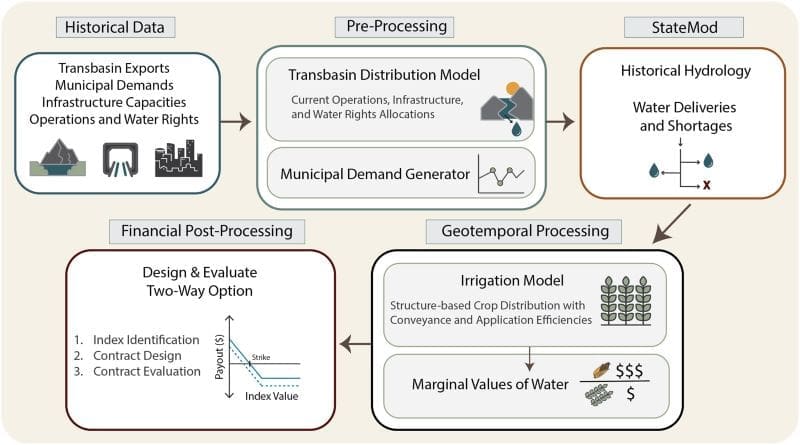Researchers from the University of North Carolina at Chapel Hill have proposed a groundbreaking two-way water leasing model designed to address water scarcity challenges in the Western United States. This model aims to balance the competing demands of urban development, agricultural productivity, and climate uncertainty, particularly during droughts.
The study, recently published in Earth’s Future, evaluates a two-way option contract that facilitates efficient water transfers between agricultural and urban users. During dry periods, cities can quickly acquire water from agricultural users, while wet years allow surplus urban water to flow back to irrigators, enhancing agricultural productivity.
“Water markets are an important tool for allocating water in the Western U.S., and other water-scarce regions around the world, but they are often slow to respond to drought, preventing re-allocation that can substantially reduce financial impacts,” said Greg Characklis, W.R. Kenan Distinguished Professor of environmental sciences and engineering at UNC and director of the newly established Institute for Risk Management and Insurance Innovation (IRMII).

The research focused on Colorado’s Front Range communities, a rapidly growing region facing increasing water challenges. The team tested their two-way leasing contracts against a 63-year hydrologic record from 1950 to 2012. The findings indicate that the model offers significant cost savings for municipalities while maintaining high water supply reliability. Simultaneously, agricultural users benefit financially through annual option payments and improved productivity in wet years when water flows back to them.
Traditionally, water reallocation in the Western U.S. has been slow and costly. Municipalities often over-purchase permanent water rights to guarantee supply during droughts, leading to inefficiencies as surplus water goes unused in average or wet years. Slow leasing processes further deter cities from returning excess water to agricultural users, causing long-term productivity losses.
“Two-way option contracts can be multi-year, and by seeking approval and working out the details in advance of a drought, transfers between mutually agreeing parties can lead to rapid and efficient reallocation of scarce water in ways that significantly reduces losses,” explained Zachary Hirsch, lead author of the study and former graduate student in the Environmental Sciences and Engineering Department at UNC.
The research team emphasized the broader implications of their model. Decades of one-way permanent water transfers have often created tensions between urban and agricultural stakeholders, while indirectly damaging agricultural economies. By ensuring reciprocity and flexibility, two-way contracts could help rebuild trust and foster cooperation among water users.
“Contracts that ensure transfers are reciprocal and responsive to changing conditions are key to restoring trust at a time when cooperative solutions to drought are desperately needed,” noted H.B. Zeff, a contributing author and IRMII’s director of research.
The study underscores the potential for this two-way model to be adapted across various water markets in the United States, offering a template for efficient and equitable water management in an era of increasing climate uncertainty.
Journal Reference:
Zachary M. Hirsch, Harrison B. Zeff, Rohini S. Gupta, Chris R. Vernon, Patrick M. Reed, Gregory W. Characklis, ‘Two-Way Option Contracts That Facilitate Adaptive Water Reallocation in the Western United States’, Earth’s Future 12 (11) e2024EF004434 (2024). DOI: 10.1029/2024EF004434
Article Source:
Press Release/Material by University of North Carolina at Chapel Hill
Featured image credit: Hustvedt | CC BY-SA 3.0, via Wikimedia Commons



